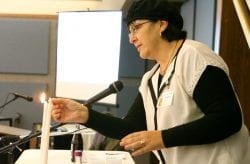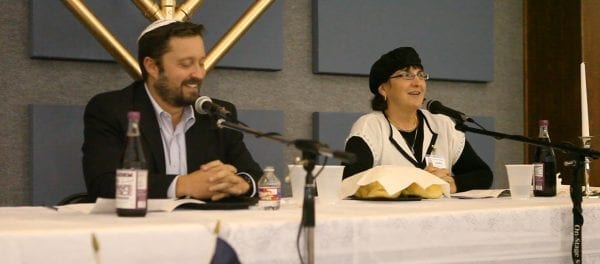Tuesday, November 4, 2014
On Sunday night, November 2, I ran a Shabbat dinner in Amarillo, Texas, hosted by a wonderful friend of CFOIC Heartland, Mike Isely and his group Texans for Israel. I have run programs of this sort in a number of different countries for the past few years, but it never ceases to amaze me. Shabbat is a uniquely Jewish concept. While Christians adopted the idea of the Sabbath from the Bible, incorporating some of the original Jewish celebration of Shabbat in their own observances over the centuries, even the original Christian Sabbath is no longer what it was. In so many countries, it was once illegal to open shops on a Sunday – no longer. Whereas Sunday was once a day set apart, with families going to church and sitting down to family meals and quiet time, today, Sunday is so often another day for shopping, or catching up even among families who still go to church on that day.
But the Jewish Shabbat is really something else. There is an ancient Jewish saying that the Shabbat kept the Jewish people even more than the Jewish people kept the Shabbat. The Jewish Shabbat comes with a huge body of laws and regulations which mandate the complete cessation of certain activities such as cooking, cleaning, farming, traveling and so many other activities that are connected with weekday work and endeavors. Therefore, when a Jew keeps the Shabbat, it means that he obeys those laws and refrains from doing what he should not be doing on that day. But in addition to the restriction of certain  activities, the Jewish Shabbat also mandates the performance of certain activities – a large festive meal complete with Kiddush and other special prayers during the meal, special services in the synagogue, the lighting of candles as the day begins, and the inclusion of two challah loaves at each meal.
activities, the Jewish Shabbat also mandates the performance of certain activities – a large festive meal complete with Kiddush and other special prayers during the meal, special services in the synagogue, the lighting of candles as the day begins, and the inclusion of two challah loaves at each meal.
Looking from the outside, this huge list of dos and don’ts might seem a terrible burden, confusing if not tiring. But what the ancient saying teaches us is that this involvement with keeping the Shabbat is what kept the Jewish people alive and together over the centuries as a unique people. Only the Jewish people celebrated the Shabbat in this way. And by retreating from the everyday and creating a spiritual and family oasis of prayer, celebration and fellowship, the Jewish people were able to strengthen their family unit, their community unit and ultimately their peoplehood.
So when I am invited to teach a Christian community about the Jewish Shabbat, it is truly a unique experience. I am not trying to preach the Jewish Shabbat to Christians as a way of life. I do believe that it is uniquely Jewish. But I do believe that the message of the Shabbat, as we celebrate it and as we have preserved it, especially as it is a very real and concrete expression of a Biblical commandment, is something that resonates in a universal way.
I never lead one of these programs on Shabbat because that is my day of rest. So participating in a Shabbat program of this sort is not the same as joining me at my Shabbat table in Israel. But it is close. We recite the Kiddush, say the blessings over the challah bread, sing special Shabbat songs and enjoy a good meal. This time, I was joined  by my dear friend Rabbi Ari Abramowitz, who shared with me the leadership of the event and provided his own insights on Shabbat. He related his own personal story of becoming a Shabbat observer as a teen-ager, growing up in a family where Shabbat was not strictly observed.
by my dear friend Rabbi Ari Abramowitz, who shared with me the leadership of the event and provided his own insights on Shabbat. He related his own personal story of becoming a Shabbat observer as a teen-ager, growing up in a family where Shabbat was not strictly observed.
What never ceases to amaze me, every time I host an event like this, is how many people approach me or some of the organizers afterwards and express their deepest appreciation for what we taught that night. Why is it that non-Jews are interested in what we are doing? I believe the answer lies in the prophecy of Zachariah: “In those days it will happen that ten men of all the languages of the nations will take hold they will take hold of the corner of the garment of a Jewish man, saying Let us go with you for we have heard that God is with you.” (Zachariah 8:23) Or as Isaiah put it: From Zion will the Torah come forth and the word of G-d from Jerusalem (Isaiah 2:3)
It is indeed a new time, when non-Jews who seek the word of G-d and read the Bible faithfully are eager to learn from Jews, to hear our perspective on the Bible and our traditions based on the commandments. More and more Christians are studying the Torah portion! I have just put out a book on the Torah portions written especially for a Christian audience, something I would never have dreamed of doing years ago. But it is a new age indeed.
Just last week, there was an international initiative within the Jewish community begun in South Africa but spread all over the world, to Jewish communities everywhere, including Israel. Jews across the globe celebrated Shabbat together. Secular Jews who had fallen away from the beauty of Shabbat were invited to enjoy Shabbat dinner with religious families or to join together religious and secular families in local community centers. In some communities, Jews pledged to “keep” the Shabbat for the first time, refraining from turning on ipads and cellphones, enjoying a day devoted to family and spirituality.
All over the world, in both Christian and Jewish communities, people are exploring Shabbat. An ancient Jewish tradition posits that if the entire Jewish community celebrates two Shabbats in a row, then Messiah will come. We may well be moving closer to that time.
Shalom,
Sondra Baras
Director

